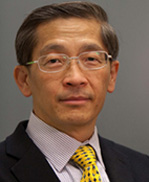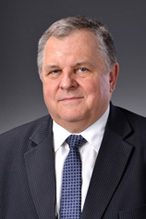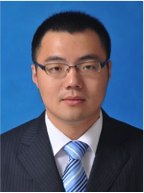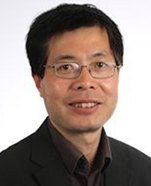
|
|
|
Keynotes
Prof. Jay Lee Keynote Topic: Trends and Recent Advances of Industrial Big Data Analytics for Smart Manufacturing Keynote Abstract: In today’s competitive business environment, companies are facing challenges in dealing with big data issues for rapid decision making for improved productivity. Many manufacturing systems are not ready to manage big data due to the lack of smart analytics tools. U.S. has been driving the Cyber-Physical-Systems (CPS), Industrial Internet, and Advanced Manufacturing Partnership (AMP) Program to advance future manufacturing. Germany is leading a transformation toward 4th Generation Industrial Revolution (Industry 4.0) based on Cyber-Physical Production System (CPPS). It is clear that as more predictive analytics software and embedded IoT are integrated in industrial products and manufacturing systems, predictive technologies can further intertwine intelligent algorithms with Machine-to-Machine (M2M) intelligence to predict product and production performance degradation and autonomously manage and optimize productivity and supply chain performance, The presentation will address the trends of predictive big data analytics and CPS for future industrial transformation. First, predictive analytics and Cyber-Physical System (CPS) enabled industrial systems will be introduced. Second, advanced predictive analytics technologies for self-aware industrial systems with case studies will be presented. Finally, business innovation based on industrial big data will be introduced using case studies. Biographical Sketch: Dr. Jay Lee is Ohio Eminent Scholar, L.W. Scott Alter Chair Professor, and Distinguished Univ. Professor at the Univ. of Cincinnati and is founding director of National Science Foundation (NSF) Industry/University Cooperative Research Center (I/UCRC) on Intelligent Maintenance Systems (www.imscenter.net) which is a multi-campus NSF Industry/University Cooperative Research Center which consists of the Univ. of Cincinnati (lead institution), the Univ. of Michigan, Missouri Univ. of S&T, and the Univ. of Texas-Austin. Since its inception in 2001, the Center has been supported by over 85 global companies including P&G, GE Aviation, Eaton, National Instruments, Boeing, GM, Ford, Chrysler, Toyota USA, Siemens, Parker Hannifin, Spirit AeroSystems, Ingersoll Rand, Intel, Applied Materials, Lam Research, Bosch Rexroth (Germany), Alstom (France), Omron (Japan), Nissan (Japan), Tekniker (Spain), FMTC (Belgium), Kistler (Switzerland), Samsung (Korea), Shanghai Electric (China), SANY (China), Baosteel (China), HIWIN (Taiwan), Foxconn (Taiwan), etc. He is the pioneer on Industrial Big Data and has authored the book “Industrial Big Data” which has been a top-selling book. He was selected as 30 Visionaries in Smart Manufacturing by SME in 2016. His current research focuses on Industrial Big Data Analytics, Cyber-Physical-Systems, and Self- Aware Asset Management Systems. He is one of the pioneers in the field of Intelligent Maintenance Systems, Prognostics and Health Management (PHM), as well as Predictive Analytics of Asset Management. He as mentored his students and won 1st prize of PHM Data Challenges five times since 2008. He also mentored his students and developed a spin-off company Predictronics through NSF ICorps Award in 2012. Currently, he serves on the Advisory Board for a number of start-up companies including Predictronics and Falkorny, etc. He was invited to be a member of White House Cyber-Physical-Systems (CPS) American Challenge Program in Dec. 2013, a member of Technical Advisory Committee (TAC) of Digital Manufacturing and Design Innovation (DMDI) in Feb. 2014, as well as a member of Leadership Council of MForesight which is an NSF/NIST Newly established manufacturing Think Tank in Sept. 2015. He serves as a senior advisor to McKinsey & Company as well as a S&T advisor to Alstom Transport, France. In addition, he serves on the Board of Governors for Frost Sullivan Manufacturing Leadership Council, SME Smart Manufacturing Digital Transformation Executive Committee, Scientific Advisory Board of Flanders' MECHATRONICS Technology Centre (FMTC) in Leuven, Belgium, Scientific Committee of SIMTech of Singapore, etc. He also serves as honorary professor and visiting professor for a number of institutions including Shanghai Jiao Tong Univ., Cranfield Univ. in UK, Lulea Univ. of Technology in Sweden, etc. In addition, he serves as editors and associate editor for a number of journals including IEEE Transaction on Industrial Informatics, Int. Journal on Prognostics & Health Management (IJPHM), Int. Journal on Service Operations and Informatics, etc, Previously, he served as Director for Product Development and Manufacturing at United Technologies Research Center (UTRC), E. Hartford, CT as well as Program Directors for a number of programs at NSF during 1991-1998, including the Engineering Research Centers (ERCs) Program, the Industry/University Cooperative Research Centers (I/UCRCs) Program, and the Div. of Design, Manufacture, and Industrial Innovation. He also served as an advisory member for a number of institutions including, Johns Hopkins Univ., Cambridge Univ., etc. He has authored/co-authored numerous highly influential articles and technical papers in the areas of Prognostics and Health Management, E-Manufacturing, Industry 4.0, and Cyber-Physical-Systems in Manufacturing, etc. He has over 20 patents and trademarks. He is a frequently invited speaker and has delivered over 300 invited speeches worldwide including over 200 keynote and plenary speeches at major international conferences. He is a Fellow of ASME, SME, as well as a founding fellow of International Society of Engineering Asset Management. He has received a number of awards including the most recent Prognostics Innovation Award at NI Week by National Instruments in 2012 and NSF Alex Schwarzkopf Technological Innovation Prize and MFPT (Machinery Failure Prevention Technology Society) Jack Frarey Award in 2014. He is also an honorary advisor to the Heifer International, a charity organization working to end hunger and poverty around the world by providing livestock and training to struggling communities.
Keynote Topic: A surveillance of dynamic processes in various mechatronic systems
Keynote Abstract: Here is commonly observed a tendency of acquiring greater knowledge and skills in scope of looking for better performance of the created technical solutions. For this reason, an essence and importance of issue of dynamic processes surveillance in modern engineering systems, from the point of view of assuring the desired process performance, will be explained. A concept of mechatronic design, which includes virtual prototyping, real time simulation and real performance on the target system, is the first fundamental of scientific and practical research. The other basis is an authorial method of the optimal control at energy performance index along trajectory of the desired motion. The latter has been applied for surveillance of dynamic processes observed in continuous and discrete linear nonstationary and nonlinear systems. Moreover, the mixed method of rigid and flexible finite element is recognised as successful tool for modelling and then – is implemented towards dynamic processes surveillance. An extensive part of considerations concerns practical applications in industry. Thus the optimal control at energy performance index has been applied for a purpose of development of the methods of surveillance of various wheeled mobile platforms as strongly nonlinear systems whose motion is subject to non-holonomic constraints. The other example of potential applications concerns vibration surveillance of a robot’s manipulator having open kinematic chain. An efficiency of the surveillance has been evidenced as well as in time and frequency domain. A wide range of scientific studies and technical tasks means the problems of vibrations during conventional and high-speed cutting processes. The latter especially concerns milling of flexible and high-dimensional details. The considered results of many research and developmental projects evidenced almost whole elimination of the vibration problem in many cases. Process quality is observed to be significantly improved as well, which classifies the obtained products even as being done by finishing grinding or lapping. Short Biography: Professor Krzysztof J. Kaliński completed his MSc study at Gdańsk University of Technology (GUT) Faculty of Production Engineering (1980, result – get a first). He obtained PhD at GUT Faculty of Machine Building (1988, result – get a first), DSc at GUT Faculty of Mechanical Engineering (ME) (2002, result – get a first), and professor’s title – w 2013 r. In 2015 r. he became full professor. His research area includes: theoretical and applied mechanics, machine dynamics, vibration engineering, dynamics of machine tools and production processes, robotics and automation, finite element methods, theoretical and experimental modal analysis, mechatronics, biomechanics of a mandible. In 2003 he created in GUT the research team of dynamic processes surveillance, subsequently evolved into a strong scientific school and renamed as Group of Mechatronics (in 2010) which is up to date under his supervision. He performed 17 domestic research and development projects (among them, 6 as organiser and supervisor), 6 international projects (2 as supervisor and coordinator) and 5 structural funds’ projects (4 as coordinator and the head). He creatively contributed the launch of field of study Mechatronics I-st level (2007) and II-nd level (2010). Prof. Kaliński’s scientific output counts 413 positions, including 225 publications and 182 unpublished works, 5 patents and 1 exclusive work. Among publications are 3 books, 46 chapters in books of international range, 21 chapters in books of domestic range, 27 scientific papers in reviewed international magazines (including 13 in the JCR journals, all-in IF=25.707), 12 scientific papers in English language in reviewed domestic magazines, 20 scientific papers in domestic magazines, 5 editions of scientific publications, 38 papers in reviewed international publications, 22 papers in reviewed domestic publications, 30 other publications. Among unpublished works are 28 project elaborations and 32 authorial computer programmes. He promoted 5 PhD holders (2007– result: get a first, 2008, 2010, 2011, 2012), among them 1 is DSc and Associate Professor. Despite 35-years’ scientific and teaching activity in GUT, he has a rich professional experience in scope of academic competences (e.g. Basrah University, Iraq – lecturer, 12 months, London University, UK – visitor, 2 months, Ecole Nationale d’Ingénieurs de Metz, France – professor visiting 3×1 month, High School of Informatics and Management in Olsztyn – professor, 2012-2015) and engineering ones (e.g. MOSTOSTAL Gdańsk – 13 months, Northern Shipyard in Gdańsk – 6 months, FUO (PPU) TECHMET Ltd. In Pruszcz Gd. – altogether 17 months, vMACH Engineering GmbH Germany, 2 years). Prof. Kaliński was Guest Editor of journal IFAC Mechatronics (2016, IF=2.076) and co-edited Springer book on “Mechatronics: Ideas, Challenges, Solutions and Applications (2016). He organised and chaired 2 large international conferences i.e. Annual GAMM Meeting Gdańsk 2009 (700 participants) and International Conference Mechatronics – Ideas for Industrial Applications (2015). For his scientific achievements he was awarded 40 times. In 2008 he became Honorary Ambassador of Polish Congresses.
Keynote Topic: Micro/Nanomanufacturing
Keynote Abstract: Bio-inspired hierarchical micro/nanostructures have offered new functionalities and developments in optical, photoelectric, interfacial, antibacterial, catalytic and mechanical systems in a wide range of modern industries. The newly added functionalities may vary significantly with respect to the geometry and feature size of the micro/nanostructures on the primary surface of the artificial components. It leads to an emergent requirement for powerful manufacturing capability to enrich the libraries of micro/nanostructures. In general, it is still a big challenge for current manufacturing society to generate the functional structures through an efficient and flexible way. In this talk, I will introduce our recent studies on the development of the novel Diamond Milling Servo (DMS) based micro/nanomachining for the generation of hierarchical micro/nanostructures. Basic surface generation and toolpath determination principles, as well as the correspondingly developed spatial motion, modulated DMS with multi-scale manufacturing capability will be introduced in detail. Typical micro/nanostructures on both planar and freeform surfaces fabricated by the DMS technique are demonstrated through experimental cutting.
Short Biography: Zhiwei Zhu received his B.E. & M.S. degrees in mechanical engineering from Jilin University, China; and Ph.D. degree in industrial and systems engineering from the Hong Kong Polytechnic University, HK SAR, China. He is currently a professor in School of Mechanical Engineering with Nanjing University of Science and Technology, Nanjing, JS China. From March 2016 to September 2016, he was a Post-Doctoral Research Fellow with the Hong Kong Polytechnic University, HK SAR, China. From October 2015 to January 2016, he was a Visiting Research Fellow with Northwestern University, Evanston, IL USA. His research interests mainly include ultraprecision machining of freeform optics, micro/nanomanufacturing, and design, modeling and control of precision mechatronic systems for measurement as well as manufacturing. Prof. Zhu is currently a Research Affiliates of the International Academy for Production Engineering (CIRP), and a member of IEEE and Euspen. He is also a Guest Editor of Chinese Journal of Mechanical Engineering.
Keynote Topic: Sustainable Manufacturing Optimisation based on Big Data Enabled Intelligent Immune System Keynote Abstract: The Big Data driven approach has become a new trend for manufacturing optimisation. In this paper, an innovative Big Data enabled Intelligent Immune System (I2S) has been developed to mimic the characteristics of a biological immune system to monitor and address manufacturing dynamics over lifecycles to achieve sustainable optimisation effectively. I2S is a novel inter-disciplinary integrated system of the artificial immune mechanism, the Wireless Sensor Network (WSN)-based Cyber Physical System (CPS), Artificial Neural Networks (ANNs) and sustainable manufacturing scheduling optimisation algorithm to fulfil two major functions: (1) an ANNs-based algorithm and analysis tools are used to identify the abnormal energy consumption patterns of manufactured components from monitored Big Data. An intelligent immune mechanism is devised to adapt to the pattern/condition changes of machine tool systems and process dynamics; (2) a re-scheduling algorithm is triggered if abnormal manufacturing conditions are detected thereby achieving adaptive multi-objective optimisation of energy consumption and manufacturing performance. In this research, Computer Numerical Controlled (CNC) machining processes have been used for system validation via industrial deployment into multiple machine lines in European factories. For the companies, around 30% energy saving and over 50% productivity improvement have been achieved by adopting I2S. The research is sponsored by EU projects for academia-industrial partnership and collaboration conducted by researchers/engineers from EU/international universities and representative manufacturing companies in Europe. Short Biography: Weidong Li is a Professor in Manufacturing working at Coventry University, U.K. His research areas include Computer Aided Design (CAD), Computer Aided Manufacturing (CAM), Additive Manufacturing (AM), Manufacturing Planning and Sustainable Manufacturing, Internet of Things and Cloud-based manufacturing. In the past decade, he has been carrying out various research and development projects in the research areas, sponsored by the European Commission, EPSRC and industries (e.g., Airbus UK, Roll-Royce UK, Sandvik Sweden, and a number of Small and Medium-sized Enterprises). From 2010, as Project Coordinator, Work Package Leader or Researcher, he has been working for FITMAN, SpinOff, CASES, CAPP-4-SMEs, CAP4COM, CASSANDRA, GREENet, SMARTER and industrial projects, through which extensive national and international academic/industrial networks have been developed. . |





